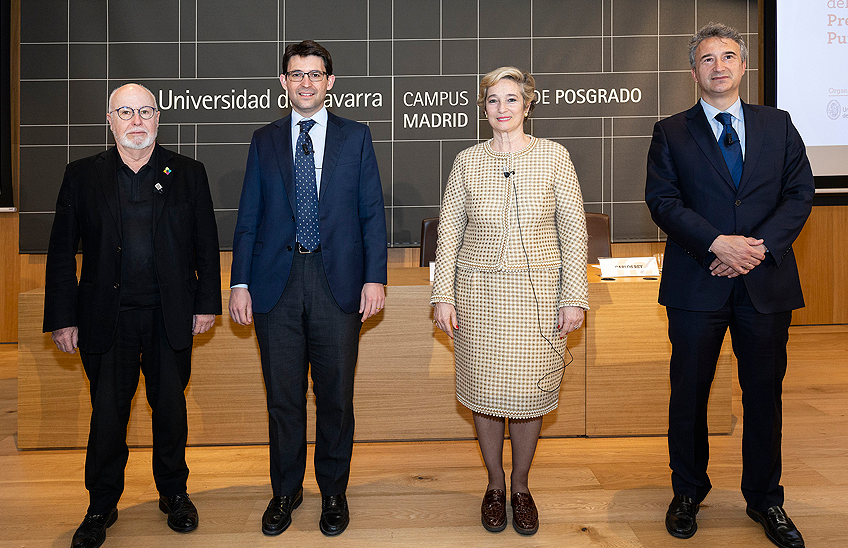A team of researchers creates an toolto measure the implementation and strength of purposein organisations.
Led by University professor Álvaro Lleó, the study evaluated 10,500 managers and employees from more than 50 organisations in eleven countries.

FotoCedida/Fromleft to right, Researchers Ángel Alloza, Álvaro Lleó, Nuria Chinchilla and Carlos Rey.
08 | 04 | 2022
A team of researchers led by Álvaro Lleó, professor at the University, has developed a toolto measure the implementation and strength of purposein organisations. The indicator, called Purpose Stength Index, was presented at the frameworkof the workshop"Measuring to accelerate the activation of purpose" which took place at the campus of the academic centre in Madrid and was attended by more than 200 people.
In four years of research, more than 10,500 managers and employees from 50 companies in eleven countries have been evaluated. In addition to Lleó, other participants in the study included IESE professor Nuria Chinchilla; Ángel Alloza, CEO of Corporate Excellence-Center for Reputation Leadership; Carlos Rey, president of the DPMC Foundation and director of the ChairManagement by Missions of the UIC; and researcherof the University of Navarra Fernando Ruiz-Pérez.
"Thanks to the Purpose Strength Model we are able to diagnose the implementation of purposeand evaluate its impact. With the information gathered we are generating an observatory of datato be able to perform statistical analysis and develop evidence-based knowledgeon the implementation of purpose," Lleó said.
Along the same lines, Ángel Alloza, CEO of Corporate Excellence - Centre for Reputation Leadership, explained that the corporate purposeshould be understood "as the foundation of the strategy, that which explains why you do what you do and which establishes the frameworkof reference letterthat guideall the actions and decisions of the organisation". The CEO of Corporate Excellence indicated that in recent years its strategic role has been discovered as sourceof transformation, generation of trust and differentiation, and indicated that the great challengeis to promote its activation and implementation in organisations: "The Purpose Strength Index offers us an indicator to measure the Degreehealth of purposein organisations and based on the balance and intensity of three dimensions core topic: knowledge contribution and internalisation".
Reconnecting with employees, more necessary than ever
On the importance of purposein companies, Álvaro Lleó indicated that its potential lies in its capacity to generate strong links with the different agents involved. In this sense, he pointed out that organisations today more than ever need to reconnect with their employees: "Internally, it is crucial, as the sustainability of an organisation will be highly conditioned by having committed and united employees. Externally, intangibles are becoming increasingly important in the value of the company. The fact that society knows about your purposeand shares it is core topicto increase recognition and reputation".
Finally, Lleó also referred to purposeas an experience: "The core topicis in going from being an organisation with purposeto one that lives its purpose. The effectiveness of its implementation depends on the consistency of the process, i.e., how people get to know the purpose, identify with it and see their day-to-day life as a contribution to their development". Therefore, he concluded, "when purposeis implemented consistently, the impact it has on individual commitment and collective unity is multiplied".
The event, which was hosted by partnershipof the International Organisation of Human Capital Managers (DCH), was also attended by Ricard Casas, director General of People and Culture of ISS; Joseba Arano Echebarria, director of People, Quality and managementEthical, managerand Excellent of Calidad Pascual; Álvaro Delgado Piera, director of Human Resources of Iberdrola International; and Alberto Andreu, director executive of Master's Degreein Personnel Management Servicein Organisations of the University of Navarra.
10 conclusions and practical recommendations
After analysing the results of the more than 50 companies analysed, reportdraws the following conclusions and practical recommendations:
- Leadership and the horizontal speechare the variables on which the organisation can act most directly.
- The least developed levers are distributed leadership and systems at management.
- The implementation of purposeraises the extra-role behaviours of workers.
- Sharing the organisation's purposeimproves individual employee engagement and collective unity among its members.
- Strategy is the main lever in the implementation of purpose. Having purpose guide and shape business decisions is crucial to enhance the meaning and contribution of your daily work.
- Trust significantly conditions the impact that leadership, the systems of management, speechand partnershiphave on the generation of shared meaning.
- Relational and contribution values are major enablers of purpose.
- The larger the organisation, the more important it is to align staffpolicies with purpose.
- Without purposethere is no commitment.
- Consistency in the implementation of purposemore than doubles the developmentof extra-role behaviours.




